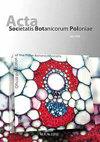In Vitro Culture as a Tool for Studying Plant Developmental Processes at the Physiological Level in Poland
IF 1.1
4区 生物学
Q3 PLANT SCIENCES
引用次数: 1
Abstract
Over the last 40 years, in vitro tissue culture has developed dynamically and has become a popular technique for scientific research in the field of biology. Initially, studies were carried out to develop procedures to obtain callus cultures, cell suspensions, and protoplasts of various plant species. Over time, these cultures have been used to analyze the course of processes and mechanisms that occur at the cellular level, including the course of embryological development, formation of cellular structures, polyploidization, signal transduction, gene expression, and responses to various stress factors. In a minireview, different nutritional, hormonal, atmospheric, and light conditions occurring in in vitro cultures, which are stressful conditions compared to those in ex vitro plant culture, were discussed. In this review, some examples of physiological studies conducted on in vitro culture by Polish scientists are presented, including studies carried out to optimize the composition of media that induce callus and plant regeneration; determine the use of in vitro culture for the preservation of endangered plant species; understand the mechanisms of resistance responses to pathogens, salinity, nutritional stress, and low temperatures; and determine the potential production of plants with different chemical compositions. The potential of sterile plant culture is large and beyond the scope of its current use. Therefore, the number and variety of applications of these cultures will be significantly greater in the future.体外培养作为研究波兰植物生理发育过程的工具
在过去的40年里,体外组织培养得到了动态发展,并已成为生物学领域科学研究的一项流行技术。最初,进行研究是为了开发获得各种植物品种的愈伤组织培养物、细胞悬浮液和原生质体的程序。随着时间的推移,这些培养物已被用于分析细胞水平上发生的过程和机制,包括胚胎发育过程、细胞结构的形成、多倍体化、信号转导、基因表达和对各种应激因素的反应。在一篇小型综述中,讨论了体外培养中出现的不同营养、激素、大气和光照条件,与体外植物培养相比,这些条件是应激条件。在这篇综述中,介绍了波兰科学家在体外培养中进行的一些生理学研究的例子,包括优化诱导愈伤组织和植物再生的培养基组成的研究;确定使用体外培养保存濒危植物物种;了解对病原体、盐度、营养胁迫和低温的抗性反应机制;并确定具有不同化学成分的植物的潜在产量。无菌植物培养的潜力很大,超出了目前的使用范围。因此,这些文化在未来的应用数量和种类将大大增加。
本文章由计算机程序翻译,如有差异,请以英文原文为准。
求助全文
约1分钟内获得全文
求助全文
来源期刊
CiteScore
2.00
自引率
10.00%
发文量
18
审稿时长
1 months
期刊介绍:
The journal has been published since 1923 and offers Open Access publication of original research papers, short communications, and reviews in all areas of plant science, including evolution, ecology, genetics, plant structure and development, physiology and biochemistry.

 求助内容:
求助内容: 应助结果提醒方式:
应助结果提醒方式:


